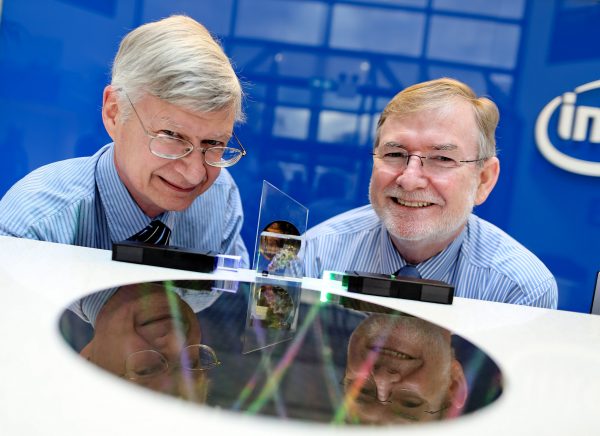3-year collaboration between Intel and Cork research institute to have impact on future electronics
Managing Director of Intel Labs Mike Mayberry and Dr. Kieran Drain, CEO of Tyndall National Institute, are pictured at the announcement of a $1.5 million research partnership between Intel and Tyndall which will see the two work together to investigate next-generation materials, devices and photonics technologies to make an impact on the challenges of developing future electronic devices.
Intel and Tyndall National Institute in Cork have announced the renewal of a $1.5 million research partnership. Intel has committed to invest $1.5 million over the next three years in developing innovative technology with Ireland’s leading ICT research institute, building on the investment of previous phases and reflecting the success of their collaborative research. The partnership, which has gone through two 3-year phases since 2009, will now run until 2018.
The agreement between Intel and Tyndall is a unique program within Intel, involving a direct relationship between researchers at Tyndall and Intel’s components research group in Portland, Oregon. Under the agreement, Intel and Tyndall will work together to investigate next-generation materials, devices and photonics technologies. Tyndall’s expertise in the field of semiconductor technology has been fundamental to the partnership with Intel, and both organisations anticipate building on the work of the first two phases of the program to make an impact on the challenges of developing future electronic devices. As in previous years, the partnership provides Intel with a commercial exploitation licence to technology created through the collaboration with Tyndall.
Bernie Capraro, Research Manager, Silicon Technology at Intel Ireland, said “We’re delighted with the collaboration with Tyndall. The standard of work from Tyndall researchers is top-class, from the work that Dr. Jim Greer does in device modelling to the photonics work of Brian Corbett. The researchers in Tyndall will be working directly with Intel’s researchers in Portland, which is the essence of the programme and what makes it so effective.” We particularly appreciate Tyndall’s flexibility, because we do alter the research programme from year to year depending on what needs we have and how our interests change.
Intel emphasise that Tyndall’s industry-focussed approach and broad knowledge across the spectrum of ICT initially attracted the company to work with the institute on a long-term basis.
“This partnership started six years ago, and what we liked about Tyndall was the breadth of technology that they had,” said Bernie Capraro. “Because of that breadth, it made sense for us to sponsor a large programme. We anticipate that Tyndall will continue to deliver on projects, and to adapt and be flexible, as they have done so far. We also hope that Tyndall will teach us about new concepts and possibilities. Often, Tyndall researchers bring solutions to Intel – rather than us coming to them with a problem, they will come to us with an opportunity, and we will evaluate whether it is something of interest that we could look at together. We appreciate Tyndall’s assistance in looking into the future of semiconductor technology and Moore’s Law, and their insights in evaluating potential future solutions.”
Dr. Kieran Drain, CEO of Tyndall National Institute, said, “It’s a great honour for us to have the partnership renewed, and it’s a major vote of confidence in the institute. Intel has world-class research partners on its doorstep in the western United States, so the fact that they would come thousands of miles to work with us here at Tyndall is reflective of our ability to offer a valuable alternative viewpoint.”























